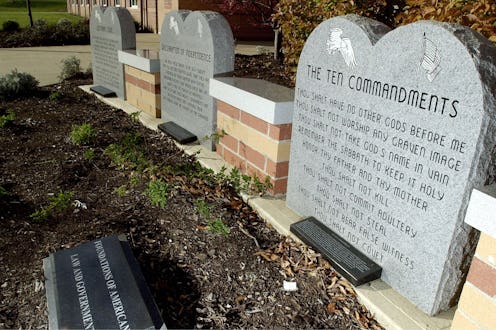News
A Lawmaker Wants To Make Teachers Read The 10 Commandments Out Loud Every Day

On Tuesday, Democratic Mississippi Rep. Credell Calhoun introduced a bill that would impose strict religious requirements on teachers in the state's public schools. Among other proposed rules, House Bill 1100 would mandate that Missouri educators read the Ten Commandments every day in the first hour of class.
In addition to reciting the Ten Commandments at the top of every day, teachers would also be required to display the Commandments prominently (at least a poster size of 11x14 inches), along with the U.S. motto "In God We Trust," in every classroom, school auditorium, and cafeteria. This is a clear violation of The Establishment Clause, which prohibits the federal government from supporting, financially or otherwise, a particular religion.
All school boards would also have to hold a 60-second moment of reflection at the beginning of each school day. This is the only regulation in the bill that doesn't technically violate the separation of church and state, given that "prayer" isn't mentioned, and a "moment of reflection" can be interpreted as non-religious.
Currently, 36 schools have moment-of-silence statues, according to the Pew Research Center. Of them, 23 schools permit the moments of silence, while 13 require them. As long as they serve some kind of secular purpose, the Supreme Court has ruled that the moments do not violate the Constitution.
Should this legislation pass, non-Christian staff and students would be given the option to opt out of reciting the Ten Commandments "without penalty," according to the bill. But it's unlikely to pass, given how many of the regulations violate the Establishment Clause. In fact, Calhoun isn't the first lawmaker to attempt something like this.
Former Republican Senate candidate Roy Moore was removed from his position as chief justice of the Alabama Supreme Court in November 2003, after he dismissed a federal court order to remove a monument of the Ten Commandments he'd installed in the state judicial building. In 2005, he told the Atlantic he "wanted to establish the moral foundation of our law."
But, as Justice Anthony Kennedy wrote in the 1992 case Lee v. Weisman, "what might begin as a tolerant expression of religious views may end in a policy to indoctrinate and coerce." Specifically, he noted that "prayer exercises in elementary and secondary schools carry a particular risk of indirect coercion.”
At this point, it's unclear if the bill will advance. Rep. Calhoun did not respond to Bustle's request for comment. If the legislation does move forward, given the nature of the mandates, it will likely be shut down in the courts.
On social media, people are already expressing outrage at the idea that students and teachers would be required to read Christian scripture in public schools. "The Ten Commandments begin, 'I am the LORD thy God...' The government has no business imposing them on citizens, let alone schoolchildren," someone tweeted. "And no, they are not the basis of American laws or government."
The Secular Coalition for America's Senior Legislative Rep. Sarah Levin spoke on a panel about the dangers of having religious symbols, like the Ten Commandments, in legislative settings that are funded by tax payers.
"Whenever we have the government involved and tax payer money involved, I think that's where we really need to think about the separation," she explained.
Levin specifically called out the Supreme Court case, Town of Greece vs. Galloway, which made it legal to hold prayer before government meetings. While the legislation is supposed to allow anyone of any religion to participate, "in practice, what's happening is once those invocation requests are coming in, then all of a sudden it's a problem because they say, 'Oh we expected to have mostly Christian prayers.'"
She said that people of non-Christian faith and non-religious people are left out of the conversation and made to feel "othered."
"If you're coming to the United States for the first time and you see a big cross or a Ten Commandments monument on government property," she asked the panel, "what would make you think this wasn't a theocracy?"